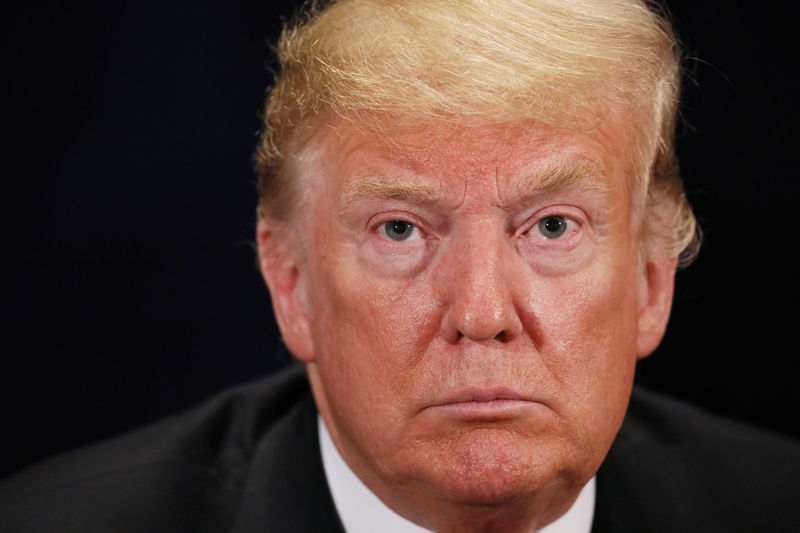(Bloomberg Opinion) -- President Donald Trump is in a bind when it comes to foreign policy and oil prices – and he knows it. On the one hand, he needs to intensify sanctions on Iran’s oil industry to put maximum pressure on the regime. On the other, he is wary of pushing up oil prices by suddenly ending Iranian exports. That would hurt U.S. consumers and the country’s manufacturing and transportation sectors – and likely the president’s poll ratings as well. The best move for the administration for now is to maintain the exemptions that the U.S. has given some nations so they may continue to import Iranian oil, but to cut them slightly.
Here’s the background. In November, the U.S. offered official exemptions from the sanctions to eight countries – including China, Japan and India - provided they kept their purchases of Iranian oil to specific quotas and paid via escrow accounts that limited the Iranian government’s use of the revenue. These exemptions were valid for six months, and within weeks the U.S. will announce whether they will be renewed, reduced or ended. If the White House does not renew at least a portion of the exemptions, oil prices will rise just as American are getting on the road for summer travel, and this will hamstring foreign policy toward Venezuela and China.
Bloomberg News has reported that the administration is divided over how to proceed. The unilateral sanctions introduced by the Trump administration in November have cut Iran’s crude oil and condensate exports from more than 4 million barrels per day to an estimated 1.8 million, according to the latest data from TankerTrackers.com. Nevertheless, National Security Advisor John Bolton wants Iranian exports halted entirely, and White House economic advisor Larry Kudlow believes there is sufficient supply in the oil market and that ending all Iranian exports will not hurt. Secretary of State Mike Pompeo, however, supports continuing the exemptions to avoid shocking the market. President Trump has shown in his words and Tweets that he prioritizes low oil prices.
Politically, Trump has little to gain from trying to zero out Iranian exports in May. In the eyes of most of his supporters, he fulfilled his campaign promise of ending Barack Obama’s nuclear deal with Iran. Harsher sanctions on Tehran will not get him many more votes in 2020. Combined with his recent designation of the Iranian Revolutionary Guard Corp as a terrorist organization, a minor strengthening of them would be sufficient to demonstrate his resolve. And the Tehran regime is unlikely to engage diplomatically with the U.S. at this juncture either way. The Iranian government and Iranian people are aware of the upcoming 2020 election and the possibility that they will be dealing with a new U.S. president in less than two years.
Trump isn’t wrong to be concerned about the price of oil. Global supplies are getting tighter and prices are rising. The U.S. benchmark, WTI, is now over $60 per barrel — its highest price this year — and the international benchmark, Brent, is hovering around $70 per barrel. OPEC oil production is at a four-year low with Saudi Arabia cutting 400,000 barrels a day since the beginning of 2019 and Venezuela down by at least 360,000. Production from Kazakhstan’s vast reserves has decreased 120,000 barrels a day, and Russian production is also slowing. Ending Iranian oil exports entirely would suddenly eliminate 1.5 million barrels per day from this market. Only Saudi Arabia has the spare capacity to make up the shortfall — but has warned it will not do so.
Banning legal Iranian oil exports would also constrain the Trump administration in Venezuela and China. The U.S. imposed sanctions on Venezuela’s oil exports to hamper the regime of Nicolas Maduro, but he remains in power, so the Trump administration is now pressuring India and China to eliminate their Venezuelan imports. The president cannot cut both Venezuelan and Iranian oil from the market and expect prices to remain stable.
In addition, as the White House negotiates on trade with Beijing, Trump must be aware of China’s desire to continue purchasing relatively cheap Iranian oil. He cannot end the exemption for China without first trying to use it as a bargaining tool in larger trade talks.
The Trump administration should end the exemptions for Greece, Italy and Taiwan because those countries aren’t importing any Iranian oil anyway. It should reduce the amount of oil and condensates India, Turkey, South Korea and Japan are permitted to import by 10 to 20 percent. It should leave China’s exemption subject to greater negotiations with Beijing.
Turning off the Iranian oil tap has no domestic or foreign-policy upside for Trump. But a more nuanced move would inform Iran that the administration is holding a firm line, allow him to focus on Venezuela and China, and keep prices at the pump reasonable for U.S. voters.
